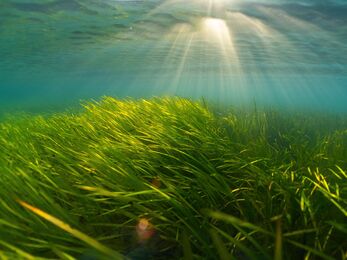The campaign, launched during National Marine Week, coincides with a government consultation on banning bottom-towed fishing gear in 41 offshore MPAs - areas at sea designed to protect special habitats or wildlife. Key sites close to our waters include the Offshore Brighton, Offshore Overfalls and Albert Field Marine Conservation Zones (MCZs), and the Wight-Barfleur Reef Special Area of Conservation (SAC).
While the Solent is home to some of the richest and most diverse marine habitats in the UK - from saltmarsh to seagrass meadows and coastal mudflats to subtidal reefs - many of the species found here depend on healthy habitats far beyond the shoreline. Offshore areas are vital links in the wider marine ecosystem that connects coastal waters with the deeper seas beyond – and are vital parts of this connected ecosystem.
The Trust is emphasising the crucial role these offshore MPAs play in supporting marine life that can be found in local inshore waters such as the Solent - one of the UK's most ecologically rich but pressured coastal zones.
Emily Stroud, Marine Nature Recovery Manager at Hampshire and Isle of Wight Wildlife Trust, says: “The Solent’s marine environment is only part of the story. Our seas are a vast, interconnected network - what happens offshore affects what we see and protect on our shores. From migratory species like European eels, bass, and thresher sharks, to species breeding in the Solent like cuttlefish, marine life needs safe habitats throughout its life cycle, across coastal and offshore waters.
“That’s why protecting the seabed in the wider English Channel is crucial - not just for biodiversity but for the health of our fisheries and the long-term recovery of marine ecosystems we all rely on.
“Marine life doesn’t recognise lines on a map. The species we love and work to protect here rely on healthy habitats throughout the English Channel.
"We’re backing this national campaign because what happens offshore matters locally. Protecting seabed habitats in deeper waters is essential if we want to see real recovery in the Solent and beyond.”
Bottom trawling - where heavy nets are dragged along the seafloor - is widely recognised as one of the most damaging fishing practices. It destroys fragile habitats, disturbs carbon-storing sediments, and undermines the biodiversity MPAs were set up to protect.
The Solent already has partial protection through local byelaws that restrict bottom-towed gear in certain habitats, such as seagrass meadows and some mud and sand flats. However, Hampshire and Isle of Wight Wildlife Trust stresses that these protections are just one piece of a larger ecological puzzle.
Many species seen in the Solent migrate across wide areas of sea and rely on connected, healthy seabed habitats throughout their lifecycles.
“Even though the Solent has some local protections, the fight doesn’t end at our shores,” adds Emily. “It’s all connected. If we want to see eels returning to our rivers, seagrass thriving in our harbours, and healthy fisheries for future generations, we need to stand up now for the whole marine ecosystem.
“Protecting offshore sites supports local marine life, healthy fisheries, and more resilient ecosystems overall.”
How to take action:
Hampshire and Isle of Wight Wildlife Trust is encouraging the public to back these proposals and demand truly meaningful protection for marine life.
Support the call to ban bottom trawling in MPAs by responding to the government consultation.
Join a local Trust event to discover the marine life on your doorstep.
Become a Trust member to support ongoing conservation work locally and across the UK.
Despite public assumptions, bottom trawling remains legal in many MPA. New research by The Wildlife Trusts shows that eighty per cent of the public believe marine wildlife should receive the same protection as land-based species, but only eight per cent correctly identified that bottom trawling is still permitted in most protected marine areas.
Daniele Clifford, marine conservation officer at The Wildlife Trusts, adds: “It’s completely understandable that people are confused. You’d think that a ‘marine protected area’ would protect all the habitats and wildlife within that area, wouldn’t you?
“The seabed is hidden beneath the waves and unfortunately, it’s been a case of ‘out of sight and out of mind’. If land-based nature reserves were being bulldozed, there would be an outcry. And yet bottom trawling has been going on for many years in these MPAs. It’s about time proper management was implemented.”


